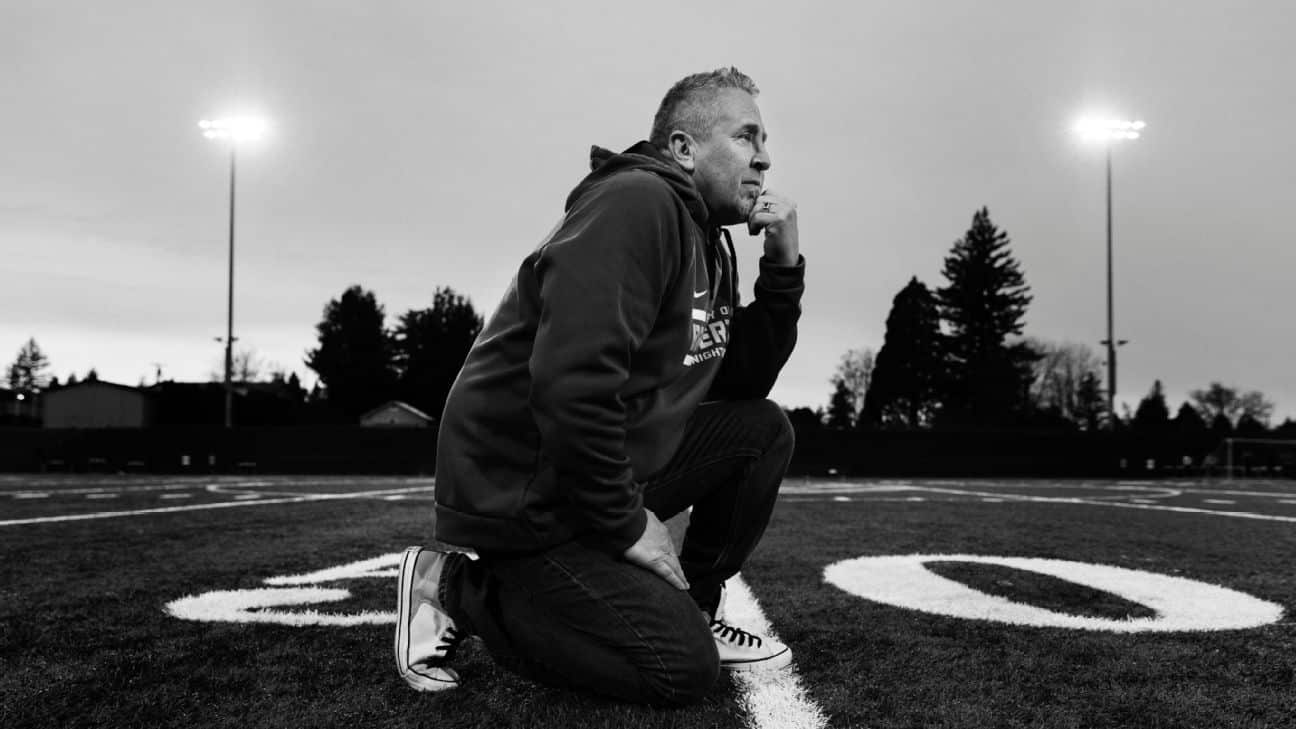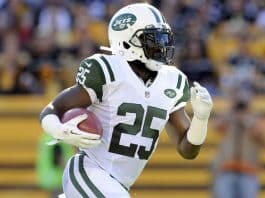BREMERTON (Wash.) Joseph Kennedy, a former assistant football coach at Bremerton High School, says he didn't want to be a symbol for the religious right or have his name mentioned in politics by Sen Ted Cruz and ex-President Donald Trump.
According to him, all he wanted was for young people to be able to play football, and also to have a short midfield prayer to God after each game.
Kennedy said that he would take a knee to thank God for the men's efforts and the chance to coach them. He also stated: “I wanted the opportunity to spend time with my players and help these young men.”
The 52-year old finds himself out of coaching and embroiled in a legal battle that erupted after he refused to take a knee at the midfield to pray following games. This was often done with students. Bremerton's public school officials fired him for refusing to stop his prayers on the field, which they claimed violated the Constitution’s prohibition against government endorsement.
The coach is a mix of fear and awe. You want to be with the coach. You want playing time. Rachel Laser, president and chief executive officer of Americans United for Separation of Church and State which represents the school board, said, “You don't need the bench.” She stated that it was a slippery slope towards religion being used to discriminate against and exclude.
Kennedy sued and his case has been a long-running one. It has traveled from a blue-collar military town in the Puget Sound, between Seattle, to the U.S. Supreme Court. Kennedy, a former Marine, was reluctantly hired to coach a poor high school football team. This case is considered potentially one of the most important cases testing the separation between church and state in recent years.
The Supreme Court must decide whether Kennedy's on field prayers are protected under the First Amendment's guarantee to religious liberty or whether they violate it by promoting his religion. The justices will hear oral arguments Monday, and will issue an opinion by late-June.
Many legal experts believe that Kennedy's case will be decided by the Supreme Court, given its recent deference toward religious liberty. The case's greater impact will depend on whether Kennedy's prayers are viewed by the justices as private expressions or public spectacles. Their decision could allow teachers and other staff to express their faith in public school classrooms without restrictions.
Howard M. Friedman, an emeritus professor at the University of Toledo College of Law, said that “the court could decide it fairly narrowly and say that this really wasn’t a personal prayer and therefore the school cannot prohibit it.” The court could also consider more extensive grounds such as the freedom of a teacher or coach to engage in religious practice, which would make it a much more important case.
KENNEDY WAS NOTHe was certain he wanted to coach at his alma mater's part-time job as a coach when the school's athletic director offered it in 2008. He hadn't played organized football before and was concerned about scheduling conflicts with his day job at Puget Sound Naval Shipyard.
He felt rejected by his adoptive parents as a child and had a problem with school discipline. He was living in a $300-a month apartment and working at a restaurant by the time he graduated from Bremerton High School. He returned to his hometown after 20 years of service in the military.
He was still considering the coaching offer and came across “Facing Giants,” a Christian drama about a football team that is lifted to the championship by a coach who praises God.
Kennedy claimed that the film had left him in tears. He said, “I was crying my eyesout.” It was clear that God wanted me to be a coach. In my entire life, I had never seen such an impact. I replied, “I'm all in God.” I will give the glory to you after every game, right there at the 50 where we fought each battle.
He joined Bremerton High as an assistant coach for the varsity team. They had lost just one game in previous seasons. He was also the head of the junior-varsity team. At first, he only prayed by himself, but after playing a few matches, his players requested to join him.
Kennedy replied, “I told them it's a free nation; this is America, and you can do what you want.” After a while, visitors joined the ranks. Officials at the school said that the activity evolved to include an inspiring talk, which sometimes included religious references. Kennedy used to stand in the middle a group of players, holding a helmet over his head, during post-game sessions. Kennedy claimed that the prayer lasted for about 30 seconds. But, he could have gone on for a while.
He stated, “It took me a while because I don't know much about preaching or praying.” It was a very simple task. I would say, “God! Thank you for these men and the opportunity to coach.
Kennedy's ritual was not questioned for years. Kennedy claimed that he received many compliments from people, even those who didn't share his religious beliefs.
Many Bremerton residents didn't realize what was happening when Kennedy kneeled on the field with nearly half of the team.
Paul Peterson, whose son Aaron Bryce played at Bremerton High football in 2010, said, “We always saw coaches and players gather on the pitch in what looked to our eyes like an attempt to rally their spirits.” “I believed they were either celebrating victory or licking their wounds. That's all we believed was going on.
Peterson also said that he was unhappy when he found out years later about the religious nature of the huddle. He stated that his philosophy was that religious instruction should be provided by parents, and should be taught at home.
Bremerton's Principal told Bremerton that Kennedy had invited his players to a post-game prayer. Kennedy's lawyers stated in legal papers, that the opposing team coach had approved of the prayer. However, Bremerton school officials tried to stop the prayer.
Kennedy received a clear message from Bremerton's Athletic Director that praying was against the rules. Kennedy then posted on Facebook that he thought he might have been fired for praying — though he was still employed at the time. That was enough to transform Kennedy's tussle with the school into a cause célèbre. According to court papers the school district received “thousands upon thousands of emails, letters, and phone calls from all over the country” about Kennedy's prayers.
Kennedy was sent a letter by school officials informing him of the district's policy on religious expression. All employees were required to be neutral. This meant that they could not encourage or discourage students from participating religious activities. They explained that the rules were designed to conform with the school district's constitutional responsibility.
“In the context of public schools, it is evident that schools and employees may not directly prohibit students participating in religious activity, nor can they require students to engage in religious activities,” said a September 2015 letter from Aaron Leavell to Kennedy. “It is also clear that school staff cannot encourage students to participate in religious activity.
Kennedy was advised that if he wanted to continue to pray following games, he would need to do so separately from students and in an area that was not obvious for others. Kennedy stated that Kennedy was offered a place to pray during home games. He could either use the school's press box, which is located above the stadium's bleachers or inside the school. This meant Kennedy had to walk several hundred meters and climb several flights of stairs.
Kennedy stated that he had stopped public prayer for just one game. Kennedy said he stopped public prayer for one game, but he regretted it as he drove home. His lawyers stated in their Supreme Court petition that Kennedy had given in to “pressure to end his commitment to God”. He stated that he turned around and drove back to the empty stadium, where he prayed silently from the 50 yard line.
Kennedy hired a lawyer and sent a letter explaining that he felt compelled to pray at the midfield after each game. Kennedy, according to school officials, did several interviews with local media outlets in order to make his decision public. This led to widespread attention. Kennedy, who was walking to midfield to exchange a handshake with his opponent team, then knelt down at the 50-yard mark to pray, officials said. In support of Kennedy, dozens of players and coaches joined him on the field.
A Satanist group protested outside the field, claiming that it wanted to also conduct ceremonies on the field following football games.
Kennedy was then placed on leave for one week after praying again on the field. The school district did not hire him for the following season. Kennedy was soon supported by religious conservatives and political figures, who helped to make him a national symbol of religious liberty.
Cruz, at the time running for president, invited Cruz to a rally just weeks after his firing. Trump, then-presidential candidate, acknowledged Kennedy at a veterans' gathering in 2016, before calling his firing “outrageous.”
Kennedy stated that he only reluctantly accepted the high-level attention but felt like he couldn't choose. He stated, “I hated that.” It is absurd to believe that this was about me, and want some praise. I want to coach football.”
KENNEDY'S LEGAL FELTIt has attracted the attention of former and current NFL players who have offered their opinions on both sides.
The headline of this article is Minnesota Vikings quarterback Kirk CousinsKennedy supported Kennedy's claim that Kennedy's prayers were private and not a government-endorsed speech that would violate the Constitution. It made a comparison between Kennedy's prayers and on-field protests that were inspired by former presidents. San Francisco 49ers quarterback Colin Kaepernick.
The brief stated that Coach Kennedy could have sat down to protest racism during the National Anthem, rather than pleading after the time has expired. “No one would think his act was governmental speech.”
Others pointed out that Kennedy's prayers were not the same as those football fans see after suffering horrific injuries or the ones of students. They suggested that Kennedy's prayers could be coercive to high school students.
Chris Kluwe, a former NFL punter and current high-school football coach, stated in court that it was wrong for any coach put high school students in this position.
Kennedy's opponents argue that showing religion at a school coach can isolate players from other faiths. They claim Kennedy impliedly invited his players to participate — which was unjust to non-Christians.
The Rev. Meghan Dowling is the pastor of Bremerton United Methodist Church. “Coach Kennedy used his school authority to force students to pray at a public high-school. This is against my conscience as an ordained pastor and a member of the community.
Kennedy says that players joined his prayers at their own discretion and that he didn't penalize anyone who did. Two players objected to the prayers in one season, Kennedy said. Kennedy stated, “I made them both my team captains because they were so stubborn about it.” I need leaders. “I don't need many drones in the field.”
Kennedy delivered his prayers in accordance with the First Amendment, but he and his supporters don't believe that he did. They believe that Bremerton's school system violates Kennedy's religious rights by banning him from his prayers.
“Nobody should lose their job because they are religious,” stated Jeremy Dys (special counsel for litigation and communications at First Liberty Institute), a legal non-profit that represents Kennedy.
Kennedy's lawsuit does not seek financial damages. He just wants his coaching job back. He moved from Bremerton two years ago to Pensacola to care for his father-in law. However, he still has children and grandchildren in Bremerton. If the court rules in his favor he said he would return to his hometown “as soon I could get there by plane.”
The high court has repeatedly ruled against teacher-led Bible readings and teacher-led prayer in public schools, as well as religious invocations at graduations and student-led prayers at football games. Since Kennedy's legal battle began, lower courts have consistently ruled in his favor.
However, many legal experts believe Kennedy has a good chance of winning this time. The Supreme Court is composed of a conservative majority of 6-3 justices. Their opinions tend to be more towards religious liberty and less toward maintaining the separation church-state.
Kennedy stated that despite the court rulings, Kennedy believes the legal battle was worth it. Kennedy said, “I tell my men that you must fight until the clock runs out.” “I would be the greatest hypocrite if i did less.”


